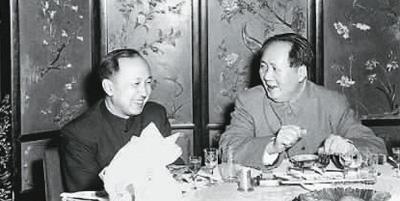Source: People's Daily Overseas Edition

Qian Xuesen and Chairman Mao Zedong together in the profile picture
Qian Xuesen is known as the "father of China's aerospace", "the father of China's missiles" and "the father of China's automation control", and has made outstanding contributions to China's scientific and technological undertakings.
From September 1935, Qian Xuesen studied at the Massachusetts Institute of Technology and the California Institute of Technology in the United States, and was diligent and diligent during his study abroad, and was later hired as a tenured professor by the Massachusetts Institute of Technology. Due to his outstanding scientific research ability and achievements, Qian Xuesen's career development in the United States has been smooth. However, when he learned the news of the founding of New China, he decided to return to China in the name of visiting relatives, bring back the 800 kilograms of books and scientific research notes he had sorted out to the motherland and participate in the construction of New China. However, when he went to the port, he was forcibly detained by the United States authorities, and all materials and books were seized. He was released after Caltech paid a huge bail. The U.S. Undersecretary of the Navy at the time said viciously: "He knows all the core secrets of the US missile project, and one Qian Xuesen is worth 5 Marine Divisions, and I would rather shoot this guy than let him go back to Red China!" ”
For as long as 5 years after that, Qian Xuesen was closely monitored. Knowing that Qian Xuesen was being persecuted in the United States, the Chinese scientific and technological circles immediately expressed solidarity with Qian Xuesen through various channels and condemned the US government's practices. The Chinese government has also repeatedly negotiated with the US side on the issue of Qian Xuesen's return to China. However, because it has never been possible to contact Qian Xuesen at home, the US side has denied detaining Chinese citizens every time. At this time, Qian Xuesen was also troubled by the lack of a way to deliver news to China. He is well aware that the issue of his return to China must be resolved by letting the top level of the state know his desire to return to China and his current situation.
One day in May 1955, Qian Xuesen found a photo of his father's friend Chen Shutong with Chairman Mao in a Chinese pictorial, and his eyes lit up and he had an idea in his heart. Qian Xuesen immediately wrote to Chen Shutong, asking him to pass on his news to the top leaders of the state. However, because He did not know Chen Shutong's mailing address, he could only send it to his father in Shanghai and transfer it on his behalf. In order to avoid the letter being withheld by the FBI, Qian Xuesen packed the letter to Chen Shutong in an envelope, asked his wife Jiang Ying to put it in a letter to his sister in Belgium, avoided the stalking agents, and threw the letter into the mailbox of a shopping mall. After Jiang Ying's sister received the letter in Belgium, she immediately forwarded it to Qian Xuesen's father's house in Shanghai. After that, the letter finally reached The hand of Zhou Enlai after several turns.
At this time, the Chinese delegation is holding ambassadorial-level talks with the United States in Geneva. In order to show China's sincerity and create conditions for Qian Xuesen's return to China, Premier Zhou Enlai personally deployed and released 11 captured American pilots in advance. However, during the negotiations, the US side still denied that the US government detained Chinese citizens. At this time, Wang Bingnan, head of the Chinese delegation, took out Qian Xuesen's letter and read it out in public, which made the US side very embarrassed. On August 4, 1955, the U.S. government, which had no excuses, had no choice but to allow Qian Xuesen to leave the United States.
On September 17, 1955, Qian Xuesen and his family came to the port of Los Angeles to prepare to return home on the "President Cleveland" cruise ship. Qian Xuesen's return to China has attracted widespread attention, and many reporters have come to the dock early to interview him. A reporter asked: After you return to China this time, do you plan to return to the United States in the future? Qian Xuesen replied calmly and firmly: "I will not come back, I have no reason to come back, this is a decision that I have been thinking about for a long time." In the future, I intend to do my utmost to help Chinese people build their country so that they can live a happy life with dignity. ”
After Qian Xuesen returned to China, he paid great attention to the development of national defense science and technology in the areas of atomic bombs and missiles. At that time, it was widely believed that China's scientific and technological level was backward and it simply did not have the ability to develop these advanced weapons. This made Chen Geng, a famous general in charge of the construction of the Military Engineering College of the Harbin Chinese the People's Liberation Army, very unconvinced. Once, Qian Xuesen went to Harbin to visit the Military Engineering College, and the dean Chen Geng happened to be in Beijing. Upon learning the news, Chen Geng rushed back to Harbin to see Qian Xuesen. The first thing he said when he met and asked Qian Xuesen was: "Is it okay Chinese to engage in missiles?" Qian Xuesen replied: "Foreigners can do it, why can't Chinese do it?" Chen Geng loudly said after hearing this, "Good! Just ask you for this sentence. After this conversation, Qian Xuesen strengthened his determination to contribute to the rocket, missile and aerospace industry of New China. (Hu Xiulei)
People's Daily Overseas Edition ( 2021-09-27 Edition 06)